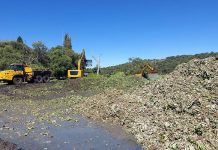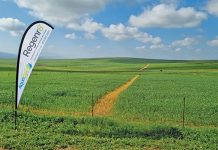A new apple with a vibrant red flesh and high levels of antioxidants will be on the UK market by 2010. Developed by Next Fruit Generation Nederland (NFG), the as-yet-unnamed variety is the result of 12 years of crossbreeding by a Swiss scientist.
he apple is a cross between a small, bitter East German apple and traditional sweet apples found in central Europe. While the initial aim was to develop an apple for the gardening sector that could be grown using fewer chemicals, tests revealed that the properties that caused the fruit’s red flesh also raised its antioxidant levels.
NFG has appointed the University of Wageningen to establish the apple’s health benefits. The fruit is also described as crisp and juicy, consistent in colour, with an appealing sweet-sharp taste.
Around 500 trees were planted in the Netherlands and Switzerland in their winter this year, and the first small volumes will come through in the 2009/10 season. NFG’s Joop van Doorn said the apple was a “true revolution” and believed it would be the next superfruit in the UK.
“Its fresh and tasty bite, amazing appearance and health credentials make it a breakthrough for the industry. It introduces a combination of fun and health that appeals to any type of consumer,” Van Doorn said. Marks & Spencer and Sainsbury’s visited Switzerland to see trial orchards and test the fruit, and NFG says they were satisfied.
G’s other new cultivars include the Gold Sensation, an extremely productive, scab-resistant round pear naturally suitable for organic production, and described as having a golden skin, “surprising” texture and deep aromatic taste. Another pear, Sweet is a red mutation of the Comice with a sweeter, deeper taste and higher yield, and fit for production in both the northern and southern hemispheres.
Visit www.nextfruitgeneration.nl. |fw
Mulch or chemicals for organic fruit?
Marlise Joubert compared the effects of different mulch and chemical treatments on organic fruit. Roelof Bezuidenhout discovers the results.
Little scientific information on organic fruit production is available in South Africa, so present guidelines for it aren’t scientifically based. That’s according to Marlise Joubert of the Agricultural Research Council (ARC) in Stellenbosch, who has done studies aimed at drawing up procedures for sustainable organic fruit production.
The studies compared two management practices applied to the tree row – chemical control and mulching. These were applied in the work row in combination with different treatments, including full surface mulching, cover crops during winter, and weed control through chemicals or by slashing in summer.
As a winter cover crop, oats suppressed the winter-growing weeds significantly, and with a winter cover crop wild radish remained the dominant winter-growing weed. Where no cover crop was sown, ryegrass was the dominant winter-growing weed. As a group, annual weed species remained dominant where a cover crop was sown.
In the treatments without a cover crop in winter, slashing the weeds in summer caused paspalum to become the dominant summer-growing weed.
No winter cover crop, weed slashing during summer, and mulch in the tree row tended to be most favourable for tree growth. The highest yield was obtained using chemical control in the tree row and slashing weeds in the work row. Nitrates, ammonium, carbon and total cations in the soil were higher in plots where mulch, rather than chemical control, was applied in the tree row.E-mail Marlise Joubert at [email protected]. |fw








